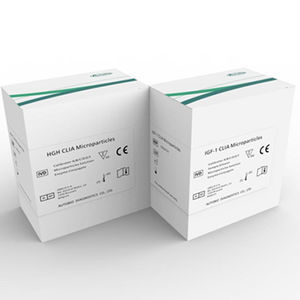
- Laboratory
- Laboratory medicine
- Pregnancy test kit
- Autobio Diagnostics
Pregnancy test kit CMN0102hCGβ-hCGAFP
Add to favorites
Compare this product
Characteristics
- Application field
- pregnancy
- Tested parameter
- hCG, β-hCG, AFP
- Sample type
- clinical, blood, serum, plasma
- Sample volume
0.01 ml, 0.025 ml
(0.00034 US fl oz, 0.00085 US fl oz)
Description
Down's syndrome (DS), also called trisomy 21 syndrome, is a relatively common chromosomal abnormality disease in newborns. Its main symptoms include severe congenital intellectual disability and specific abnormal facial features. The disease has a severe impact on the child's study, life and growth. Prenatal diagnosis is an effective method to detect DS and prevent the birth of DS children. The combination of chorionic villus sampling, amniocentesis and cord blood chromosome examination with clinical symptom analysis is the international golden standard of DS diagnosis.However, these assessments are to some extent invasive to the pregnant women, and requires complicated operations of healthcare professionals, and therefore are difficult for widely application. Nowadays, the most common prenatal DS screening is serum screening, which takes blood serum from the pregnant woman and measures the levels of alpha-fetal protein (AFP), unconjugated estriol (uE3), pregnancy-associated plasma protein A (PAPP-A) and β-human chorionic gonadotropin (β-HCG) to screen and detect DS.
Clinical Significance
HCG is a glycoprotein hormone produced by syncytiotrophoblastic cells of the placenta. The β-HCG level in the mother's blood serum can be used to detect DS. If the fetus has DS, then the serum β-HCG level will be significantly elevated. If HCG is detected in individuals without pregnancy, it would imply tumors that can directly or ectopically secrete this hormone, for example, hydatidiform mole, invasive hydatidiform mole, choriocarcinoma, immature teratoma of ovary, dysgerminoma of ovary, glandular ovarian cancer, hypothalamic choriocarcinoma, hepatoblastoma,
Catalogs
No catalogs are available for this product.
See all of Autobio Diagnostics‘s catalogsRelated Searches
- Autobio Diagnostics test kit
- Solution reagent kit
- Autobio Diagnostics blood test kit
- Autobio Diagnostics serum test kit
- Plasma assay kit
- Infectious disease detection kit
- Diagnostic reagent kit
- Respiratory infection test kit
- Autobio Diagnostics clinical test kit
- COVID-19 detection kit
- Clinical chemistry analyzer
- Bacteria reagent kit
- Antigen assay kit
- Clinical reagent kit
- IgG test kit
- Automatic clinical chemistry analyzer
- Benchtop clinical chemistry analyzer
- Laboratory detection kit
- Autobio Diagnostics cell test kit
- Microbiology reagent kit
*Prices are pre-tax. They exclude delivery charges and customs duties and do not include additional charges for installation or activation options. Prices are indicative only and may vary by country, with changes to the cost of raw materials and exchange rates.



